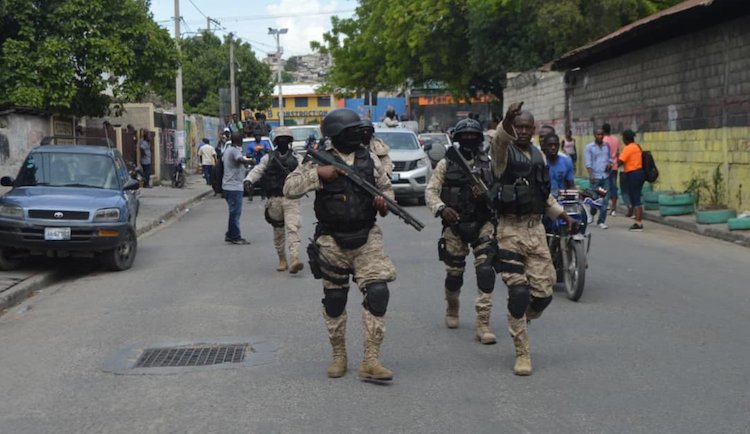By Lisa Vives, Global Information Network
NEW YORK (IDN) – Demonstrators have been filling the streets of downtown Port-au- Prince in Haiti, as anger and frustration over government mismanagement and corruption boils over.
Protestors are now demanding the resignation of President Jovenel Moise. Hundreds gathered in downtown Port-au-Prince a few days ago to demonstrate against economic mismanagement and corruption and to ask for President Jovenel Moise to step down.
Moise’s administration is under fire over the misspending of nearly $2 billion from a Venezuelan program earmarked for the poor. The Venezuelan PetroCaribe Discount Oil program provided cheap petroleum products and generous credit terms to Central American and Caribbean nations, throwing them an economic life-line when oil was selling for $100 per barrel.
But instead of paying for hospitals, schools, roads, and other social projects, the money was mostly diverted into other projects, according to a January report from Haiti’s Superior Court of Auditors.
Anger over the Petrocaribe scandal burgeoned into a grassroots movement against widespread corruption in Haiti, which is ranked 161 out of 180 countries on Transparency International’s Corruption Perceptions Index.
At downtown demonstration, protestors chanted: “Kot kòb PetroCaribe a?” – “Where’s the PetroCaribe money?” The President and Prime Minister Jean Henry Céant, in an address to the nation, promised to conduct a full investigation into the missing funds.
“It’s the same feeling like when Jean-Claude left,” said supermarket owner Abraham Rayes, in an interview with the Miami Herald. He was referring to the departure of Haitian President-for-Life Jean-Claude “Baby Doc” Duvalier, whose 1986 departure from Haiti amid a popular uprising ushered in the country’s 33-year tumultuous democracy. “Not the killings, but the shortages; water, food, electricity.”
“The economy is bad, really bad,” Rayes’ son Christopher in the market amidst empty shelves as normal supply chains have been cut off by rioting and roadblocks. “Food prices are going up and the minimum wage is [$6.12] a day. …You have to work three days to buy rice and cooking oil.”
Erta Degramond, 51, an unemployed mother, told a reporter that life in Haiti has become unbearable. While food was already expensive before the protests, it has become even more so in recent days, she said.
But the straw that broke the camel’s back, according to journalist Kim Ives, writing for Haiti Liberte, was the President Moïse’s betrayal of the Venezuelans after their display of solidarity. On Jan. 10, 2019, in a vote at the Organization of American States (OAS), Haiti voted in favor of a Washington-sponsored motion to say that Nicolas Maduro was “illegitimate,” despite winning an election in May 2018 with over two-thirds of the vote.
“Today’s revolution shows all signs of being as profound and unstoppable as that of 33 years ago against playboy dictator Jean-Claude “Baby Doc” Duvalier,” Ives wrote. Duvalier escaped from Haiti on Feb. 7, 1986 to exile in France on a U.S. Air Force cargo plane. It was the beginning of five years of popular tumult.
The violent unrest is beginning to take a humanitarian toll as protesters clash with police, stone ambulances and erect roadblocks shutting off major highways and roads. Canada has advised citizens to avoid all travel to Haiti and the U.S. State Department raised the travel warning to a level 4, telling U.S. citizens: “Do not travel to Haiti due to crime and civil unrest.” The Department of State also ordered the departure of all non-emergency U.S. personnel and their family members.
Harold Lazard, 43, a chemistry professor, said in a media interview, “The population wants the president to go, so there can be change, there can be another system, one where we have hospitals that function, healthcare, education, security. With this system we have here the poor are dying of hunger with only dirt to eat.
“It’s not the opposition who closed the country but the population,” he said. “It’s the population that has decided it no longer wants to live in hunger, in misery.”
Ives concurred. “Ironically, it was Venezuelan solidarity which may have postponed for a decade the political hurricane now engulfing Haiti.” [IDN-InDepthNews – 18 February 2019]
Photo: Haitian National Police units have been having a tough task containing the outbreaks of violence and looting, restore order and freedom of movement. Credit: Guestonn Fermy / PNH 2019
IDN is flagship agency of the International Press Syndicate.
facebook.com/IDN.GoingDeeper – twitter.com/InDepthNews
Send your comment: comment@indepthnews.colo.ba.be
Subscribe to IDN Newsletter: newsletter@indepthnews.colo.ba.be

